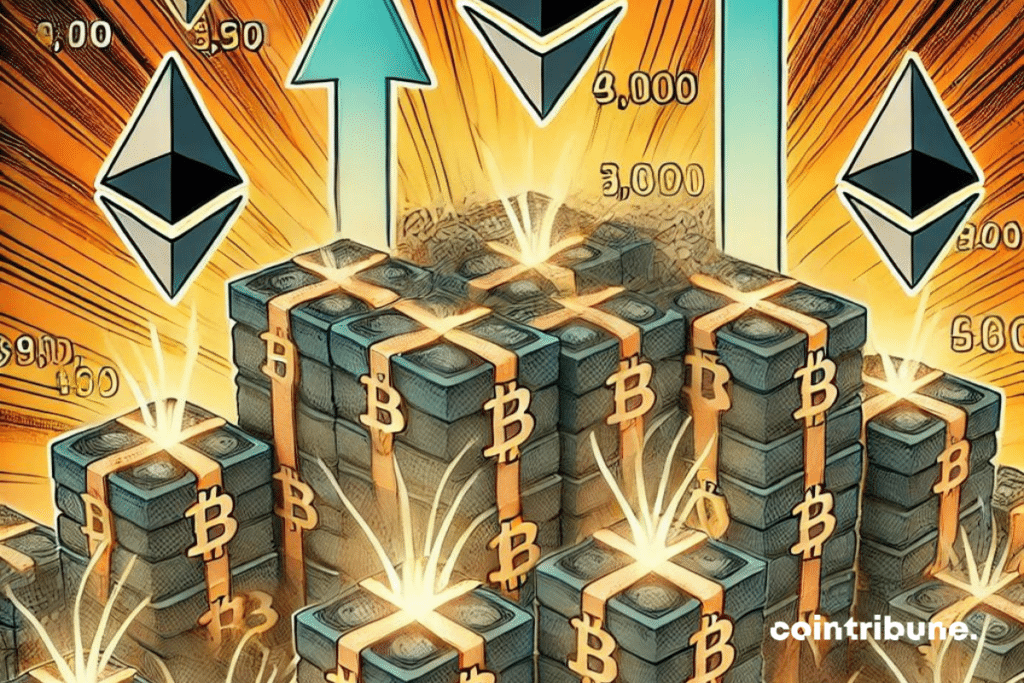Crypto: Transaction Fees Are Skyrocketing On Ethereum!
Ethereum, the second-largest blockchain in the world, is once again in the spotlight. As its network continues to gain popularity, particularly with the rise of decentralized finance (DeFi) platforms, a recurring issue resurfaces: the surge in transaction fees. Indeed, with record volumes on decentralized exchanges (DEX) and an exponential increase in the number of active addresses, Ethereum is facing growing congestion that directly impacts its users.

A surge in fees due to unprecedented on-chain activity
The spike in transaction fees on the Ethereum network is primarily due to an explosion in on-chain activity. Indeed, the number of active addresses on Ethereum has seen a 29% increase over the past few weeks. This increase in active addresses reflects the enthusiasm of traders and investors for DeFi applications and DEX transactions. Furthermore, new addresses registered on the network have jumped by 43%, a figure that shows growing interest in the Ethereum ecosystem but also exacerbates network congestion.
In parallel, volumes traded on DEX platforms have reached new heights. Thus, within 24 hours, nearly $978 million worth of Ethereum was traded on these platforms, with a weekly volume exceeding $8.38 billion. This intense activity leads to block saturation, making transactions longer to confirm and thus more expensive. Such a situation creates a dilemma for everyday users, who find themselves caught in a spiral of ever-increasing gas fees.
The impact of staking and future outlook
Besides the activity on DEX and the growing number of addresses, another factor is driving up fees: staking. After a period of massive withdrawals during the last bear market, Ethereum’s staking flows are experiencing a revival. Data shows that the total amount of ETH staked has returned to its all-time high. A balance is observed between staking inflows and outflows, reflecting renewed investor confidence in the network. This resurgence in staking translates to an additional volume of transactions on the blockchain, thus intensifying congestion and, consequently, transaction costs.
In the coming months, the rise in fees could have several implications. Indeed, it may deter new users from adopting Ethereum, especially those making small transactions. Furthermore, it could raise more questions about the long-term viability of Ethereum as an accessible and affordable network. However, with the anticipation of a bullish market for the last quarter of the year, this trend might continue. If Ethereum fails to resolve this gas fee issue, scaling solutions like Layer 2 or even competing networks could capture an increasing share of users.
The rise in transaction fees on Ethereum is the price of increasing success. The rise of staking and DEX, combined with an increase in active addresses, has created unprecedented congestion. As the ecosystem prepares for a potential surge in Ethereum prices, the sustainability of these gas fees remains an open question. The coming months will be crucial to observe if solutions such as sharding or Layer 2 networks can ease this tension and allow Ethereum to maintain its dominance in the blockchain market.
Maximize your Cointribune experience with our "Read to Earn" program! For every article you read, earn points and access exclusive rewards. Sign up now and start earning benefits.
Diplômé de Sciences Po Toulouse et titulaire d'une certification consultant blockchain délivrée par Alyra, j'ai rejoint l'aventure Cointribune en 2019. Convaincu du potentiel de la blockchain pour transformer de nombreux secteurs de l'économie, j'ai pris l'engagement de sensibiliser et d'informer le grand public sur cet écosystème en constante évolution. Mon objectif est de permettre à chacun de mieux comprendre la blockchain et de saisir les opportunités qu'elle offre. Je m'efforce chaque jour de fournir une analyse objective de l'actualité, de décrypter les tendances du marché, de relayer les dernières innovations technologiques et de mettre en perspective les enjeux économiques et sociétaux de cette révolution en marche.
The views, thoughts, and opinions expressed in this article belong solely to the author, and should not be taken as investment advice. Do your own research before taking any investment decisions.